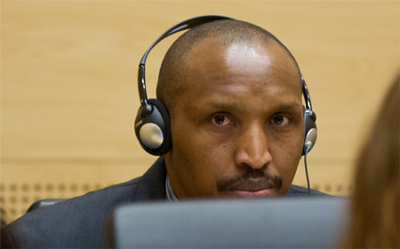
Mr Ntaganda (former alleged deputy chief of the staff of the Forces Patriotiques pour la Libération du Congo) was surrendered to the ICC custody on 22 March 2013. The confirmation of charges hearing was held from 10 to 14 February 2014. A total amount of approximately 69,000 pages of evidence was disclosed between the parties and submitted to the Chamber for its determination.
Based on the evidence submitted to its consideration, the Chamber found that there was a widespread and systematic attack against the civilian population pursuant to an organisational policy adopted by the Union des Patriotes Congolais/Forces Patriotiques pour la Libération du Congo (UPC/FPLC) to attack civilians perceived to be non-Hema, such as those belonging to Lendu, Bira and Nande ethnic groups. The attack took place between on or about 6 August 2002 and on or about 27 May 2003, in Ituri Province, Democratic Republic of the Congo (DRC). In addition, the Chamber found that a non-international armed conflict between the UPC/FPLC and other organized armed groups took place between on or about 6 August 2002 and on or about 31 December 2003 in Ituri Province, DRC.
The Chamber found that, as part of the widespread and systematic attack against the non-Hema civilian population and in the context of the non-international armed conflict, the crimes with which Bosco Ntaganda is charged were committed during two specific attacks, in addition to war crimes committed by the UPC/FPLC throughout the conflict. These specific attacks were carried out in identified locations in Banyali-Kilo collectivité between on or about 20 November and on or about 6 December 2002 and in identified locations inWalendu-Djatsi collectivité between on or about 12 and on or about 27 February 2003.
As specified in the decision, the Chamber found that Bosco Ntaganda bears individual criminal responsibility pursuant to different modes of liability, namely: direct perpetration, indirect co-perpetration (article 25(3)(a) of the Statute); ordering, inducing (article 25(3)(b) of the Statute); any other contribution to the commission or attempted commission of crimes (article 25(3)(d) of the Statute); or as a military commander for crimes committed by his subordinates (article 28(a) of the Statute).
Subject to the right of the Prosecutor and the Defence to request leave to appeal pursuant to article 82(1)(d) of the Statute, the Presidency of the ICC will constitute a Trial Chamber in due course.
Related articles
- • DRC and Rwanda Sign Declaration of Principles for Peace in Eastern Congo (April 25, 2025)
- • European Union Sanctions Rwanda and M23 Officials over Congo Conflict (March 17, 2025)
- • Canada and Germany Impose Sanctions on Rwanda for Supporting M23 Rebels (March 4, 2025)
- • UK Suspends Financial Aid to Rwanda Over M23 Rebellion (February 25, 2025)
- • European Union Suspends Defence Consultations with Rwanda (February 24, 2025)
- • Tshisekedi Announces Government of National Unity and Calls for Unity Against M23 Rebels (February 23, 2025)
- • UN Security Council Calls on Rwanda to Stop Supporting M23 Rebels in DR Congo (February 22, 2025)
- • US Sanctions Rwanda's Minister James Kabarebe for Central Role in DR Congo Conflict (February 20, 2025)
- • Rwanda-Backed M23 Rebels Summarily Executed Children in Bukavu, UN Reports (February 19, 2025)
- • DR Congo Citizens Head to Polls to Elect President, Members of Parliament (December 20, 2023)
- • Jean-Pierre Bemba named MLC presidential candidate (July 13, 2018)
- • Peacekeepers, Congo Army to Resume Joint Fight Against Rwandan Rebels (January 28, 2016)
- • Political tensions 'running high' in DR Congo ahead of 2016 elections (October 7, 2015)
- • UN Report Blames Ugandan Islamists for 237 Killings in DR Congo (May 14, 2015)
- • DRC Army Putting Pressure on FDLR (April 1, 2015)
- • ICC Confirms 14-Year Sentence Against Thomas Lubanga (December 1, 2014)
- • ICC Case Against Bemba Wrapping Up as Another Opens (November 12, 2014)
- • Southern African Leaders to Meet in Zimbabwe (August 15, 2014)
- • ICC sentences Germain Katanga to 12 years (May 23, 2014)
- • Kerry Calls on Kabila to Honor Constitution (May 4, 2014)
- • Security Council extends UN mission, intervention force in DR Congo for one year (March 28, 2014)
- • ICC finds Germain Katanga guilty of war crimes and crime against humanity (March 7, 2014)
- • Bosco Ntaganda Attacked Civilians on Ethnic Grounds, ICC Prosecutor Says (February 10, 2014)
- • New DR Congo amnesty law welcomed by UN envoys (February 5, 2014)
- • Colonel Mamadou Ndala Is Killed in Ambush (January 2, 2014)
- • DR Congo, M23 Rebels Sign Declarations Marking End of Kampala Peace Talks (December 12, 2013)
- • No 'Peace Deal' With Defeated M23 Rebels, DR Congo Says (November 11, 2013)
- • Congo Army Takes Control of Mbuzi Hill From M23 Rebels (November 4, 2013)
- • Kabila Congratulates Congo Army for Defeating M23 Rebels (October 30, 2013)
- • Advancing Congo Troops Take Control of Rumangabo From M23 Rebels (October 28, 2013)







